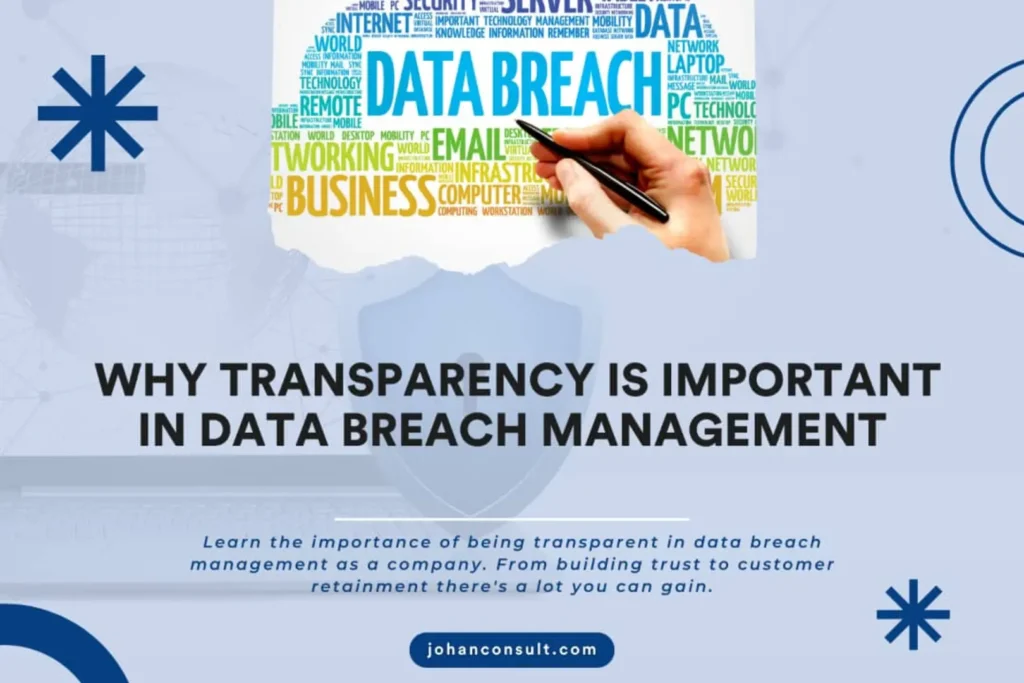In March 2020, statistics showed that Cyber scams increased by 400%, and this trend did not improve in 2023. This statistic simply means that we are at more risk of getting our personal information stolen or misused. Therefore, effective data breach management is more important than ever.
Imagine waking up to find that your personal data has been stolen and used for unexpected purposes. Extremely scary right? That’s exactly what we deal with as we become more reliant on technology. For this reason, customers need to have effective data management strategies to protect customers’ data.

However, while safeguarding your system from these breaches is not 100% guaranteed, effective data breach management strategies can help build trust. Also, you can let your customers know whenever a breach occurs.
Do Customers Really Need to Know?
Sometimes, companies believe their customers do not need to know when their data has been stolen or misused, but I strongly disagree. Whenever a customer shares their information, they absolutely trust that you’ll protect their data.
So, when their data gets stolen, that’s also a breach of trust and you’ll have to show them that you have their interest at heart. As a company, once your customers’ data is stolen, you’d have to contact a body that handles cybersecurity issues in your country within 72 hours.
After placing the report, you can then proceed to check what data was stolen. If you find out that the data stolen was just your customer’s name or the data won’t put them at any risk, then there’s no need to inform them. This is the only exception when a data breach occurs.
On the other hand, if you discover that the stolen data poses a risk to your customers, you need to inform them. Your company can do this by making a formal announcement. For example, Twilio experienced a data breach that exposed 33 million phone numbers belonging to Authy users.
This breach was discovered in June 2024 after a hacking group called ShinyHunters shared a file they claimed to contain numbers of Authy users. When Twilio discovered this, they made a public announcement on July 1 to inform their users and the public about the breach.
Furthermore, Twilio went on to inform the 163 customers who were affected. Due to Twilio’s transparency, only a few percent of their customer base got discouraged. However, they were still able to gain customers’ trust which is a core part of data breach management.
Should Companies Be Held Responsible For A Data Breach?

Sometimes, it isn’t always clear who to blame whenever a breach occurs. A data breach can either occur due to human error or an error from the company. But in most cases, the company usually shoulders the blame. Here’s why.
Whenever customers put their data into a company’s system, they expect that the company will be responsible for protecting their data. Some of these customers aren’t even aware that certain things they do can open them up to risk. So, they end up blaming the company for not taking appropriate precautions to prevent the breach.
However, even if the company gets sued for the breach if it’s a larger organization, the CISO — Chief Information Security Officer or anyone in charge of the company’s data security will face the repercussions. This is because the CISO is responsible for making decisions on data security.
Aside from the CISO, other people that could be blamed for any data breach are employees. Employees if not trained can become victims of phishing attacks. Because these attackers tend to use data from discarded drives to trick employees into sharing private information.
Why Companies Should Be Transparent With Customers After Data Breach
In 2016, Uber fell victim to a massive cyber attack that compromised the personal data of millions of users. Instead of promptly notifying the public, Uber opted to conceal the breach and paid a ransom to the hackers. This decision ultimately led to a loss of customer trust, legal consequences, and a tarnished reputation.
When the news of the breach finally surfaced in 2017, Uber faced intense backlash and criticism for its lack of transparency and failure to safeguard user data. The company’s handling of the breach resulted in a significant loss of customers and a damaged brand image.
Importance of Transparency in Data Breach Management
Below are the reasons why companies need to be transparent with their data breach management with consumers.
1. Helps Build Trust
By being open and honest about the breach, companies demonstrate their commitment to transparency and accountability. This eventually helps to maintain customer trust. Trust is a fragile asset that can be easily lost when a data breach occurs, but transparency can help mitigate this loss.
Additionally, when companies are transparent about a breach, they show customers that they value their relationship and are willing to be vulnerable. This vulnerability can actually strengthen the bond between the company and its customers. By being transparent, companies can rebuild trust and emerge stronger from the experience.
2. Transparency in Data Breach Management Shows Empathy
Transparency in data breach management procedures acknowledges the potential harm caused to customers. It shows empathy and understanding of their concerns. Whenever a company is transparent about a breach, it shows customers that it understands the potential impact on their lives. Also, empathy can help customers feel seen and heard, which can reduce anxiety and frustration.
Furthermore, when companies acknowledge the harm caused, they can take the first step toward healing and rebuilding trust. Empathy is an essential component of transparency, and it can help companies go through the crisis more effectively.
3. Provides Clarity
Clear communication helps customers understand what happened, what data was affected, and what steps they can take to protect themselves. Clarity is essential in a crisis, as it helps reduce uncertainty and anxiety.
When companies provide clear communication, they enable customers to take action and protect themselves.
Clear communication also shows customers that the company is committed to transparency and accountability. By providing clarity, companies can reduce the risk of further damage and help customers feel more secure.
4. Enables Prompt Action
Transparency in data breach management allows customers to take prompt action to protect their sensitive information. This helps to reduce the risk of further damage. Companies that are transparent about a breach, provide customers with the information they need to act quickly. This prompt action can help prevent some other breaches.
Some of these breaches are identity theft, financial fraud, and other negative consequences. Additionally, by enabling prompt action, companies can reduce the impact of the breach. It also helps companies reduce the legal and financial repercussions of a breach.
5. Supports Regulatory Compliance
Transparency in data breach management is often required by data protection regulations, such as GDPR and CCPA, to avoid legal repercussions. Companies that fail to comply with these regulations can face significant fines and legal action. By being transparent about a breach, companies can demonstrate their commitment to compliance.
This would help reduce the risk of legal repercussions. Also, transparency in data breach management can help companies avoid damaging their reputation and financial losses. Furthermore, by supporting regulatory compliance, companies can maintain trust with their customers and stakeholders.
6. Fosters Customer Loyalty
Companies that are transparent about data breach management sometimes experience increased customer loyalty. Because customers appreciate honesty and accountability. Anytime companies are transparent about a breach, it shows their commitment to customer privacy and security.
Also, being transparent can help companies build strong, long-term relationships with their customers.
7. Encourages Collaboration
Transparency in data breach management can encourage collaboration between companies, researchers, and authorities to improve security and prevent future breaches. When companies are transparent about a breach, they can share information and insights with others in the industry.
With this collaboration, it is easier to identify vulnerabilities and improve security measures. Furthermore, when companies work together with other companies or researchers, they can reduce the risk of future breaches and create a safer online environment.
Additionally, collaboration can also help companies stay ahead of cybercriminals and reduce the financial and legal repercussions of a breach.
Final Thoughts
In the end, transparency in data breach management is about being honest and vulnerable with your customers. It’s about owning up to mistakes, showing empathy, and providing clarity in a time of crisis. By being open and transparent, companies can build trust, foster loyalty, and create a safer online environment for everyone.
It’s time for companies to prioritize transparency and take a human approach to data breach management. Only then can we create a digital world where people feel safe and protected?










